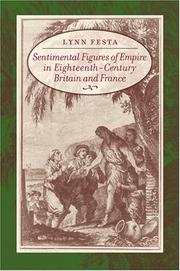| Listing 1 - 3 of 3 |
Sort by
|

ISBN: 0801889340 9780801889349 0801884306 9780801884306 Year: 2006 Publisher: Baltimore : Johns Hopkins University Press,
Abstract | Keywords | Export | Availability | Bookmark
 Loading...
Loading...Choose an application
- Reference Manager
- EndNote
- RefWorks (Direct export to RefWorks)
Festa makes the case that what people read about their relations with their colonies shaped their identities, particularly when what they read cast the colonizers as saviors. Using a variety of sentimental fiction ranging from novels, poetry, travel accounts, commerce manuals and philosophical writings, Festa traces the development of the image of the aboriginal as Other but one worthy of pity and attempts at redemption, with the affect being readers' formation of themselves as individuals and differentiated by superiority. In scene after scene, the Other is overawed by the benevolence of those bringing the benefits of modern life, with sentimental emotions such as sympathy soaking every word. The author traces through number of complex ideas, including sentimental re-writing of history, emotions in an age of mechanical reproduction, the tales told by things people make, tropes of redundant personification, and the sympathetic misfire.
Colonies in literature. --- Imperialism in literature. --- Sentimentalism in literature. --- French fiction --- English fiction --- History and criticism. --- Bellettrie. --- Empfindsamkeit. --- Engels. --- Englisch. --- English fiction. --- Frans. --- Französisch. --- French fiction. --- Inheemse volken. --- Kolonialismus --- Koloniën. --- Literatur. --- Sentimentalisme. --- Wilder. --- History and criticism --- 1700-1799. --- Geschichte 1730-1790.

ISBN: 9780521604581 Year: 2008 Publisher: Cambridge [England] ; New York : Cambridge University Press,
Abstract | Keywords | Export | Availability | Bookmark
 Loading...
Loading...Choose an application
- Reference Manager
- EndNote
- RefWorks (Direct export to RefWorks)
"This study of sensibility in the eighteenth-century novel discusses literary representations of suffering and responses to it, in the social and scientific context of the period. The reader of novels shares with some scientific observers the activity of gazing on suffering, leading Ann Van Sant to explore in the broader social context - specifically in the display of repentant prostitutes and the children of the vagrant and criminal poor and in certain scientific experiments - the coincidence between the rhetoric of pathos and scientific presentation. Showing that when sensibility becomes central to an understanding of psychology, it becomes the basis for an experimental approach to character, she argues that Samuel Richardson's method of revealing his heroine's heart in Clarissa is analogous to the enterprise of scientists creating and observing suffering in order to study interior physiological functions." "The book goes on to explore sensibility's location of psychological response in physical structures. Van Sant invokes eighteenth-century debates about the relative status of sight and touch in epistemology and psychology, as a context for discussing the "man of feeling," a spectator who reports on "touching" experiences. Focusing principally on Laurence Stern's A Sentimental Journey, she argues that the man of feeling's experience is located in the body - by definition both feminized and physiological, and therefore inherently parodic." "In a further note on readers of sensibility, she examines the relation between focusing on a physiologically defined moment and the fragmented, intensified episodes of the sentimental narrative."--Jacket.
Emoties. --- Emotions in literature. --- Emotions in literature. --- Empfindsamkeit. --- Engels. --- Englisch. --- English fiction --- English fiction. --- Geschichte (1700-1800). --- Geschichte (1730-1790). --- Leid --- Literature and science --- Literature and science. --- Literature and society --- Literature and society. --- Littérature et sciences --- Littérature et société --- Maatschappij. --- Roman anglais --- Roman. --- Roman. --- Romans. --- Sens et sensations dans la littérature. --- Sensation --- Senses and sensation in literature. --- Senses and sensation in literature. --- Sentimentalism in literature. --- Sentimentalism in literature. --- Sentimentalisme dans la littérature. --- Émotions dans la littérature. --- History and criticism --- History --- History --- Histoire --- Histoire --- Histoire et critique --- In literature. --- 1700-1799. --- Englisch. --- Great Britain. --- Gro�britannien.
Book
ISBN: 9791026704393 Year: 2016 Publisher: Ceyzérieu : Champ vallon,
Abstract | Keywords | Export | Availability | Bookmark
 Loading...
Loading...Choose an application
- Reference Manager
- EndNote
- RefWorks (Direct export to RefWorks)
"Exerçant son action du cabaret au salon, du bordel à la loge maçonnique, la police de Paris serait-elle 'la plus parfaite', comme certains le proclament au siècle des Lumières, pour tenir une aussi grande ville d'Europe? La vaste réforme impulsée au temps de Colbert en 1666-1667 ne se limite pas à la création de la lieutenance générale de police. Tout au contraire, elle inaugure une dynamique de transformation des pouvoirs policiers parisiens : il s'agit d'améliorer le recrutement et les pratiques des commissaires au Châtelet, des inspecteurs et des auxiliaires, ces 'mouches' et espions qui fréquentent les 'petits cafés' et les lieux louches, tous métamorphosés en 'bons ouvriers' de la sûreté publique. Plus préventive que répressive, la police renforce sa surveillance sur la société et son emprise sur le territoire urbain ; soucieuse du 'bonheur des hommes en société', elle intervient dans les domaines de la salubrité, de la sante ́, de la voirie, des arts et métiers, du commerce et des marchés pour rassurer et protéger les 'bons citoyens'. Mais cette 'force vigilante et active' (Louis Sébastien Mercier) est là aussi pour surveiller, évincer, enfermer, sans faiblesse, les 'indésirables' et faire taire le 'peuple murmurant'. Aussi nourrit-elle constamment des tensions : les résistances ne cessent jamais et la cristallisation des critiques autour du 'despotisme' de la police est un puissant ferment de l'effervescence pré-révolutionnaire. À partir des années 1760, la philosophie du droit naturel, une nouvelle idée de la liberté et de la souveraineté politique rendent l'arbitraire policier de moins en moins acceptable. Ces critiques rencontrent le vécu ordinaire des hommes et des femmes à la vie fragile, qui savent la police dure aux pauvres et à tous les laissés-pour-compte du 'beau XVIIIe siècle'. En 1789, la dénonciation du despotisme de cette police qui a prétendu se^ mêler de tout, qui a voulu tout connaître, tout prévoir, érige les services de la lieutenance générale en emblème de la tyrannie, une Bastille à abattre pour qu'enfin triomphent l'état de Droit et l'égalité de tous devant la Loi."--Page 4 of cover.
Police --- Police administration --- Police management --- Cops --- Gendarmes --- Law enforcement officers --- Officers, Law enforcement --- Officers, Police --- Police forces --- Police officers --- Police service --- Policemen --- Policing --- History --- Administration --- Management --- Legal status, laws, etc. --- Paris (France) --- Parijs (France) --- Pařiž (France) --- Parizh (France) --- Parigi (France) --- Bārīs (France) --- Lutetia (France) --- Paryż (France) --- Lutèce (France) --- Párizs (France) --- Parisioi (France) --- Parisi (France) --- Parys (France) --- باريس (France) --- Parij (France) --- Parĩ (France) --- Pa-lí (France) --- Париж (France) --- Горад Парыж (France) --- Horad Paryz︠h︡ (France) --- Парыж (France) --- Paryz︠h︡ (France) --- Парис (France) --- Parighji (France) --- Pariggi (France) --- Pariis (France) --- Παρίσι (France) --- Париж ош (France) --- Parizh osh (France) --- Parizo (France) --- Páras (France) --- Paarys (France) --- Pâ-lì-sṳ (France) --- 파리 (France) --- Palika (France) --- פריז (France) --- Policiers / Paris (France) / 18e siècle --- Policiers / Formation / Paris (France) / 18e siècle --- Police / Aspect politique / Paris (France) / 18e siècle --- Police / Relations publiques / Paris (France) / 18e siècle --- Violence policière / Paris (France) / 18e siècle --- Police / Administration / Paris (France) / 18e siècle --- Services de renseignements / Paris (France) / 18e siècle --- Polizei --- Geschichte 1730-1790 --- Paris
| Listing 1 - 3 of 3 |
Sort by
|

 Search
Search Feedback
Feedback About
About Help
Help News
News